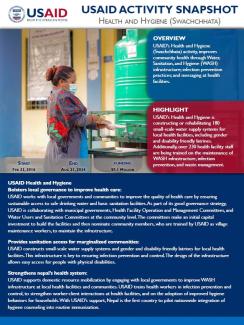START: FEB 22, 2016 | END: AUG 21, 2024 | FUNDING: $9.1 MILLION
OVERVIEW
USAID’s Health and Hygiene (Swachchhata) activity, improves community health through Water, Sanitation, and Hygiene (WASH) infrastructure; infection prevention practices; and messaging at health facilities.
HIGHLIGHT
USAID’s Health and Hygiene is constructing or rehabilitating 180 small-scale water supply systems for local health facilities, including gender and disability friendly latrines. Additionally, over 230 health facility staff are being trained on the maintenance of WASH infrastructure, infection START prevention, and waste management.
USAID Health and Hygiene Bolsters local governance to improve health care:
USAID works with local governments and communities to improve the quality of health care by ensuring sustainable access to safe drinking water and basic sanitation facilities. As part of its good governance strategy, USAID is collaborating with municipal governments, Health Facility Operation and Management Committees, and Water Users and Sanitation Committees at the community level. The committees make an initial capital investment to build the facilities and then nominate community members, who are trained by USAID as village maintenance workers, to maintain the infrastructure.
Provides sanitation access for marginalized communities:
USAID constructs small-scale water supply systems and gender and disability friendly latrines for local health facilities. This infrastructure is key to ensuring infection prevention and control. The design of the infrastructure allows easy access for people with physical disabilities.
Strengthens Nepal’s health system:
USAID supports domestic resource mobilization by engaging with local governments to improve WASH infrastructure at local health facilities and communities. USAID trains health workers in infection prevention and control, to strengthen worker-client interactions at health facilities, and on the adoption of improved hygiene behaviors for households. With USAID’s support, Nepal is the first country to pilot nationwide integration of hygiene counseling into routine immunization.


